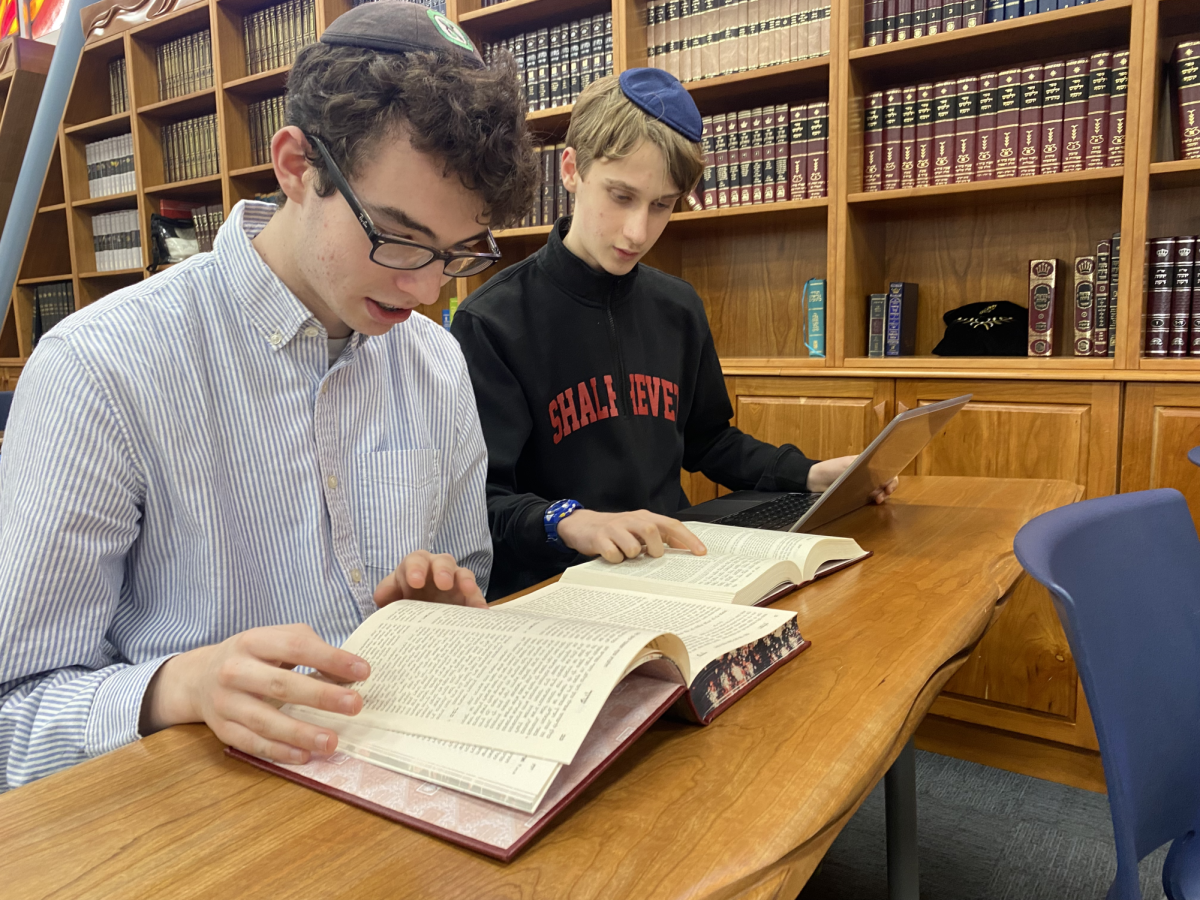Last Monday morning’s Torah service was lained by Jojo Fallas in distinctive Sephardic trope. And as in previous minyans, a girl — this time, senior Leah Katz — marched the Torah up the girls’ side of the mechitzah to the bimah, something which had not been expected after boys appointed to lead the service had said they would not allow it.
Jojo said the boys were given control of the service so they could lead it according to Sephardic customs.
“The point of the minyan is not to take away women carrying the Torah, its purpose is Sephardic,” Jojo said. “I think it was just easier to solve both issues with the same minyan.”
“Personally, I have no problem with women carrying the Torah,” he added.
It was unclear what would happen after Sukkot break. In the latest in a series of actions concerning davening, Judaic Studies Principal Rabbi Leubitz said that for now, Sephardic-style davening would be held just once a week in the Beit Midrash minyan, on Mondays.
He did not say whether he would require the leader to hand the Torah to a female student no matter what.
Rabbi Leubitz acknowledged the debate going on over girls carrying the Torah, but said he cut the Sephardic variations, or nusach, to once a week primarily because Sephardic liturgy was unknown to too many students.
“I think changing the nusach twice a week was probably too much,” Rabbi Leubitz explained, referring to previous plans to have Sephardic nusach on both Torah-reading days, Mondays and Thursdays.
“I was feeling they were just going to do just the melodies, and they came back and said we actually want to do the Sephardic text, and I said if we do the Sephardic text, too many kids don’t know the Sephardic texts, it’s too much — let’s try this once a week.”
“I don’t think the women’s carrying of the Torah is a prime reason for decision-making.” he added.
Last Thursday, Rabbi Leubitz had authorized a group of junior boys to lead the Beit Midrash minyan in Sephardic nusach, or style, on both Torah-reading days.
In a move that came as a surprise after weeks of open debate over the issue, he appointed Jojo Fallas, Adam Wannon, Jordan Banafsheha and Rony Shemtov, whose Sephardic home synagogues allow only men to carry the scrolls. The boys indicated that girls would not be carrying the Torah..
That meant junior and senior girls would not have the opportunity to carry it in the upperclassmen’s minyan, where they are a large numerical majority. Girls would still carry the Torah on the girls’ side in the freshman-sophomore minyan, which meets in the Media Center.
“Women who want to join the minyan in the Media Center on Mondays and Thursdays may do so,” Rabbi Leubitz said.
Last Thursday, the first day the boys were in charge, Jojo Fallas took the Torah down the aisle on the boys’ side of the mechitza and then handed it to Aviva Prinz, who carried back up the aisle on the girls’ side. This had been the custom all year, though an increasing number of boys had been complaining about it.
Later, Jojo said this had not been the plan.
“Women were allowed to carry the Torah today because we did not feel that they were properly informed of what was going to happen,” Jojo said in an interview Thursday afternoon.
“The girls were supposed to be told that if they wanted to carry the Torah they should go do the other minyan, and frankly it is uncomfortable for everyone involved to ask them to do that.”
Leah, who has been outspoken in defense of girls’ right to carry it, thought the change was extreme.
“Let me get this straight,” Leah said. “They’re hijacking the entire upperclassmen minyan to satisfy their personal vendetta?
“If they want a Sephardic minyan where they would not be made uncomfortable by women carrying the Torah, they have my blessing,” she continued. “However, I really don’t think that their discomfort should be able to make this drastic change in the structure of the entire minyan.”
Rabbi Leubitz said changes could be made if the decision was protested sufficiently, but that he had yet to see this.
Later, he clarified. “It’s not that if the girls yell louder they’re going to get it, or the boys… That’s not how I’m looking at it. We’re trying ot find a solution that works for everyone. It’s that if the model doesn’t work for this constituency, we’re going to find a way to make it work.”
The new changes are the latest in a series of administrative decisions regarding davening. Effective this year, students had only been offered the option of attending two minyans, grouped by grades.
Leaders of previous years’ Yoga Minyan, Discussion Minyan and Basketball Minyan, for example, have been told to work with the Agenda Committee on a proposal that will be given to Rabbi Leubitz to approve or reject. Agenda Committee’s role in the process is to guide students through a proposal-writing process and make recommendations to Rabbi Leubitz, which he will consider based on the extend to which they address various logistical and educational concerns.
Rabbi Leubitz compared Agenda’s new role to that of the Fairness Committee in discipline issues.
“Fairness will make a decision and bring it to me and by and large I’m going to follow the recommendation,” he said. “Maybe I’ll tweak it, but I’ll take it very seriously. Same thing with Agenda.”
He added that more coordination was needed with the Agenda Committee on this topic.
Rabbi Leubitz has said that if approved, so-called “experiential” minyans, which add experiences to davening in addition to prayer, could be permitted to operate two days per week.
“Two years ago we had a lot of small minyanim,” Rabbi Leubitz said. “I think that was a bad model because the resource of the faculty got too thin… It’s much easier for us to have bigger minyanim, so we’re not looking to expand too much.”
But Sephardic prayer differs from usual Shalhevet davening primarily in the customs and tunes, or nusach, used by the leader.
“The Sephardic issue was something we wanted to expedite,” Rabbi Leubitz said. “It’s not an experiential minyan, it’s just a different nusach.”
The issue of whether girls should carry the Torah at Shalhevet minyanim was first raised at Town Hall Sept. 15, after members of the Agenda committee learned that some boys had been complaining about the practice.
In most Orthodox synagogues, the Torah stays on the men’s side of the mechitzah, along with all the ritual functions and objects of the prayer service including tefillin, aliyot, and the leading of prayers and Kaddish. This has been the tradition for centuries and is still the case in Haredi communities throughout the world, including in Los Angeles.
In recent decades, most Modern Orthodox shuls, including the ones attended by most Shalhevet students, Beth Jacob, B’nai David-Judea, and also the Sephardic synagogue Nessach, bring the Torah through the women’s section. But only B’nai David allows women to carry it.
At Town Hall, some claimed the Torah should not be used as a means to an end, and accused girls of wanting to carry the Torah just to prove their equality with men. Girls disagreed.
“I am a feminist, but I’m not doing it for feminist reasons,” said senior Deanna Grunfeld, who sometimes carried the Torah in the Bet Midrash minyan. “I actually feel a spiritual connection.”
Some boys who were against it said their reasons were religious, but others said that they found it distracting, and that it made them uncomfortable.
“My only problem is that it doesn’t follow our tradition, and I don’t think it’s right to stray away from traditions,” said Adam Wanon.
Agreed Michael Lenett, “It takes away from my davening experience. I have this spiritual connection, and when I see the girls carrying the Torah up their aisle, I lose it.”
Not all boys in the school, however, shared the same opinion.
“When I’m praying, I’m not concerned about anyone else, I’m just focusing on myself,” said freshman Alex Schwartz. “So if they want to carry the Torah, I think we should let them.”
All the teachers who spoke and at least half the students argued in favor of women carrying the Torah. When it was over, Agenda Chair Leona Fallas took an informal vote on whether a separate minyan could be established for those who wanted male-only carrying. A strong majority voted yes.
But when it was over, the issue didn’t die. A handful of boys continued to press for a minyan where girls would not carry the Torah; meanwhile, some of those same boys pressed for a separate Sephardic minyan.
The current decision apparently meets both sets of concerns.
VIDEO: Two problems solved at once as Sephardic minyan debuts 11/10/2011
EDITORIAL: On women and Torah, Shalhevet should lead 11/4/2011
Related: Tradition may rule, but law says girls can carry the Torah 11/3/2011
Related: Shalhevet stands alone in letting girls carry the Torah, survey finds 11/3/2011
Related: Sephardic minyan approved; no changes to Ashkenazic minyan 10/28/2011
Related: Meeting yesterday began process of minyan decisions, Rabbi Segal says 10/26/2011
Related: Girls may no longer carry the Torah at junior-senior minyan 10/7/2011








Jordan Banafsheha • Oct 11, 2011 at 9:49 am
UPDATE: Because there is no school Thursday, the Sefardim had permission to lead a sefardic minyan in the main minyan today, tuesday.
Adam Kellner • Oct 11, 2011 at 8:33 am
“Monday morning’s Torah service was lained by Jojo Fallas in distinctive Sephardic trope, a first in recent memory at Shalhevet.”
Jojo lains pretty much every week and always in always with sephardic trope
Jordan Banafsheha • Oct 11, 2011 at 11:04 am
True that